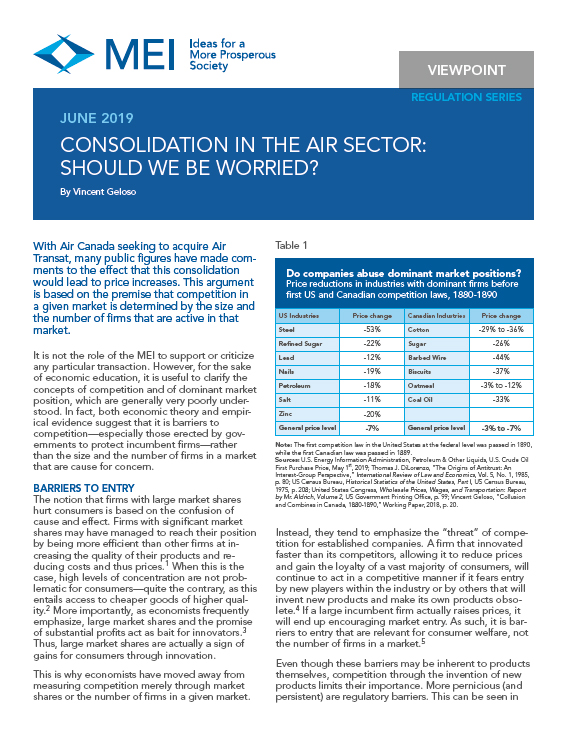Air Canada’s purchase of Air Transat: Should consumers be worried?

Montreal, June 4, 2019 – While Air Canada is looking to purchase Air Transat, a publication released today by the MEI shows that the concerns of travellers regarding potential price increases should not be based on greater market concentration, but rather on the presence of barriers to entry in the air travel industry.
“To properly measure the degree of competition in a market, we must go beyond the number of firms or market shares, and look instead at whether it is possible for companies to compete with established players,” explains Vincent Geloso, Associate Researcher at the MEI and author of the publication.
Indeed, the notion that firms with large market shares hurt consumers is based on the confusion of cause and effect. Companies with significant market shares may have managed to reach their position by being efficient, by increasing the quality of their products, and by reducing costs, and thus prices. When this is the case, high levels of concentration are not problematic for consumers. On the contrary, this means cheaper goods of higher quality.
“A firm that innovated faster than others, allowing it to reduce its prices and gain the loyalty of a majority of consumers, will continue to act in a competitive manner if it fears the entry of competitors. If, on the other hand, a well-established firm actually raises prices, it will end up encouraging market entry,” points out Mr. Geloso.
It is thus the presence of barriers to entry in an industry that harms the interests of consumers, not the number of firms in a given market.
Many of these barriers are the result of government policies. For example, in the case of the air travel industry, the Canada Transportation Act limits competition by prohibiting non-Canadian carriers from carrying passengers between Canadian cities. This means that a European carrier cannot take on passengers in Toronto, drop them off in Montreal, and pick up new passengers there before heading to Europe. This barrier to competition does not stem from the market, but rather from government policies.
In fact, the publication shows that where cases of large firms abusing their consumers have been confirmed, it is frequently with the help of governments.
“Those who are concerned with consumer welfare, in the air travel industry and in general, should concern themselves more with barriers to competition than with the size and the number of firms in a market. It is these obstacles, especially those erected by governments to protect incumbent firms, that really end up costing us,” concludes Michel Kelly-Gagnon, President and CEO of the MEI.
The Viewpoint entitled “Consolidation in the Air Sector: Should We Be Worried?” was prepared by Vincent Geloso, Associate researcher at the MEI. This publication is available on our website.
* * *
The MEI is an independent public policy think tank. Through its publications and media appearances, the MEI stimulates debate on public policies in Quebec and across Canada by proposing reforms based on market principles and entrepreneurship.
-30-
Interview requests: Daniel Dufort, Director of External Relations, MEI. Tel.: 514-273-0969 ext. 2224 / Cell: 438-886-9919 / Email: ddufort@iedm.org

